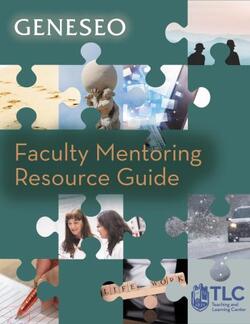TLC Faculty Mentoring Program
The TLC Faculty Mentoring program pairs newer faculty members with more senior faculty members from different disciplines at SUNY Geneseo. This relationship typically lasts for an academic year, though partners may choose to continue to work together longer if they wish.
About the TLC Faculty Mentoring Program
The purpose of this voluntary mentoring relationship is to help support our newer faculty in an informal manner during their transition into the Geneseo community. Topics and frequency of mentoring sessions are decided upon by the pair, and could include discussions of institutional expectations, networks, and practices relevant to productivity and advancement.
This mentoring program is considered outside of the tenure and review process, and all discussions are confidential and independent of the promotion process. This faculty mentoring program is administered by the Teaching and Learning Center, with support from a TLC Faculty Fellow with an extensive background in peer mentoring program development.
The TLC Faculty Mentoring Program adheres to a guiding list of principles. Many of these are research-based and come from both face-to-face mentoring and e-mentoring literature. These principles have been adapted from the Faculty Mentoring Program of the University of Vermont (UVM).
-
Multiple-mentor model – new hires on today’s campuses need to have an array of mentors to succeed, including someone outside of your department and college, and someone inside. The Faculty Mentoring program will pair you with a mentor outside of your department network; we also encourage you to find other mentors or peer-mentors to assist you with enculturation into your department.
-
Protégé-driven model – with professionals as protégés, a protégé-driven model is most effective. Therefore, the TLC Faculty Mentoring program will provide supports and suggestions for new hires to direct their mentoring relationships.
-
Provision of program structure – Throughout the course of the academic year, the TLC Faculty Mentoring Program will send out mentoring tips and discussion suggestions – what is called “coaching” in the mentoring literature. The coaching messages will provide topics to discuss, reinforcement for you to stay in contact with your mentoring partner, and will provide a line of communication between the program and the participants. Applying this sense of structure to the individual mentoring partnerships, we suggest that you schedule a few meetings out. Why? Because for busy academics, if we don’t get these important but not urgent meetings on our calendars early, they will be crowded out by many other responsibilities and meetings.
-
Utilize useful suggestions, disregard the rest – throughout the academic year, and starting with this agreement, the TLC Faculty Mentoring Program will provide opportunities for training, coaching, and group mentoring. Use the techniques and attend events that seem valuable to you – disregard the rest.
-
Value of program and partnership assessment – The TLC Faculty Mentoring Program is committed to assessment of the program, to make mid-course corrections as needed and to quantify the outcomes of the program. Likewise, assessment between mentors and protégés is important, so informal techniques for mentoring partnership assessments will be sent periodically.
-
Confidentiality – Any sensitive issues that are discussed within the mentoring partnership should be held in confidence. We recommend clarifying ahead of time what "confidential" means to each of you in this context. If a topic is brought up and either party is not comfortable discussing the topic, the topic will be considered “off-limits” and the discussion should change to other topics without any negative ramifications.
-
No-fault mentoring policy – The TLC Faculty Mentoring Program has a no-fault mentoring policy. Some mentor pairs simply don’t meet the needs of both mentoring partners. This could be due to scheduling conflicts, or any other reason. If that is the case then the no-fault mentoring policy applies – just contact the Teaching and Learning Center or the senior adviser to rematch you.
Support for TLC Faculty Mentors

Information and training opportunities for potential faculty mentors are offered in September and January each year. Anyone interested in peer mentoring is welcome to attend. Watch the TLC Events calendar for more details.
Additional information about our program can be found in the Geneseo Faculty Mentoring Resource Guide.